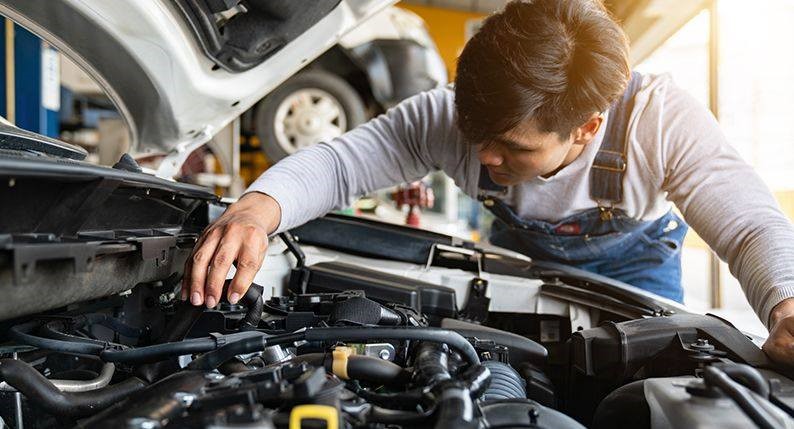Auto Services Fort Worth TX is essential for ensuring your vehicle’s safety, performance, and longevity.

Neglecting your tires can lead to reduced fuel efficiency, poor handling, and increased risk of accidents. In this comprehensive guide, we’ll explore the steps you can take to maintain your car’s tires for optimal performance and longevity, from regular inspections to proper inflation and rotation.
1. Regular Inspections
Regular tire inspections are crucial for identifying potential issues before they escalate. Here’s what to look for during a tire inspection:
- Tread Wear: Check the tread depth using a tread depth gauge or the “penny test.” Insert a penny into the tread groove with Lincoln’s head facing down. If you can see the top of Lincoln’s head, the tread is too shallow, indicating the need for replacement.
- Uneven Wear: Inspect the tread for signs of uneven wear, such as cupping, scalloping, or feathering. Uneven wear patterns may indicate alignment issues, suspension problems, or improper tire inflation.
- Cuts and Punctures: Check the tire sidewalls and tread for cuts, bulges, or punctures. Even small damage can compromise tire integrity and lead to failure.
- Tire Pressure: Use a tire pressure gauge to check the air pressure in each tire, including the spare. Under-inflated or over-inflated tires can affect handling, fuel efficiency, and tire life.
2. Proper Tire Inflation
Maintaining the correct tire pressure is critical for safety and performance. Follow these guidelines for proper tire inflation:
- Refer to the Owner’s Manual: Consult your vehicle’s owner’s manual or the placard located on the driver’s side door jamb for the recommended tire pressure. This information is specific to your vehicle’s make, model, and tire size.
- Check Tire Pressure Regularly: Monitor tire pressure at least once a month and before long trips. Use a quality tire pressure gauge to measure pressure when tires are cold, as hot tires can give inaccurate readings.
- Adjust for Temperature Changes: Tire pressure fluctuates with temperature changes. In colder weather, tire pressure tends to drop, so check and adjust pressure accordingly.
- Avoid Over-Inflation: Over-inflated tires can result in a harsh ride, reduced traction, and premature wear in the center of the tread. Use caution when adding air to avoid exceeding the maximum pressure indicated on the tire sidewall.
3. Proper Tire Rotation
Regular tire rotation promotes even tire wear and extends the life of your tires. Follow these guidelines for proper tire rotation:
- Follow Manufacturer Recommendations: Refer to your vehicle’s owner’s manual for the recommended tire rotation interval. As a general rule, tires should be rotated every 5,000 to 7,500 miles or as specified by the manufacturer.
- Rotate Tires in Proper Sequence: The recommended tire rotation pattern varies depending on whether your vehicle has front-wheel drive, rear-wheel drive, all-wheel drive, or four-wheel drive. Common rotation patterns include front-to-back, cross rotation, and modified X-pattern.
- Inspect Tires During Rotation: Take the opportunity to inspect tires for signs of uneven wear, damage, or other issues during rotation. Address any issues promptly to prevent further damage.
4. Wheel Alignment
Proper wheel alignment ensures that your tires make consistent contact with the road surface, promoting even wear and optimal handling. Here’s what you need to know about wheel alignment:
- Schedule Regular Alignments: Wheel alignment should be checked and adjusted as needed whenever you notice symptoms of misalignment, such as uneven tire wear, pulling to one side, or steering wheel vibration.
- Follow Manufacturer Recommendations: Some vehicle manufacturers recommend periodic alignment checks, typically every 10,000 to 12,000 miles, even if there are no apparent issues. Follow the manufacturer’s recommendations for optimal performance and tire longevity.
- Address Alignment Issues Promptly: If you notice symptoms of misalignment, have your vehicle inspected by a qualified technician. Ignoring alignment issues can lead to premature tire wear and other problems.
5. Tire Balancing
Balancing your tires ensures that weight is evenly distributed around the wheel assembly, preventing vibrations and uneven tire wear. Here’s what you need to know about tire balancing:
- Schedule Regular Balancing: Tires should be balanced whenever they are mounted on a wheel or when you notice symptoms of imbalance, such as steering wheel vibration at certain speeds.
- Use Quality Wheel Weights: Ensure that quality wheel weights are used during balancing to achieve accurate results and prevent corrosion or damage to the wheel finish.
- Address Balance Issues Promptly: If you experience vibrations or other symptoms of imbalance, have your tires balanced by a qualified technician. Ignoring balance issues can lead to uneven tire wear and discomfort while driving.
6. Tire Storage and Care
Proper storage and care can help preserve the condition of your tires when not in use. Follow these tips for tire storage:
- Clean Tires Before Storage: Remove any dirt, debris, or brake dust from the tires before storing them to prevent staining or deterioration.
- Store Tires in a Cool, Dry Place: Store tires indoors or in a climate-controlled environment away from direct sunlight, heat sources, and moisture. Avoid storing tires near solvents, petroleum products, or ozone-generating equipment.
- Use Tire Covers: Consider using tire covers or protective bags to shield tires from UV rays, ozone, and other environmental factors that can degrade rubber compounds.
- Rotate Stored Tires: If storing tires for an extended period, rotate them periodically to prevent flat spots from forming. Ideally, tires should be rotated every six months or so.
Conclusion:
Proper tire maintenance is essential for ensuring optimal performance, safety, and longevity of your vehicle’s tires. By following the guidelines outlined in this guide, including regular inspections, proper inflation, rotation, alignment, balancing, and storage, you can maximize the lifespan of your tires and enjoy a safer, more comfortable driving experience.
Circle S Auto Service
12195 N Saginaw Blvd #120, Fort Worth, TX 76179, United States
1-817-439-8020

Leave a Reply